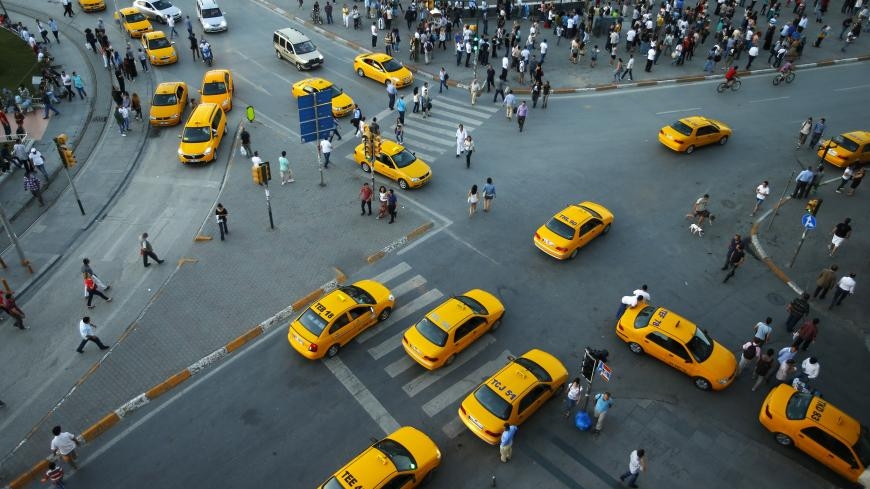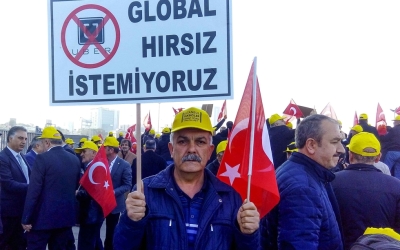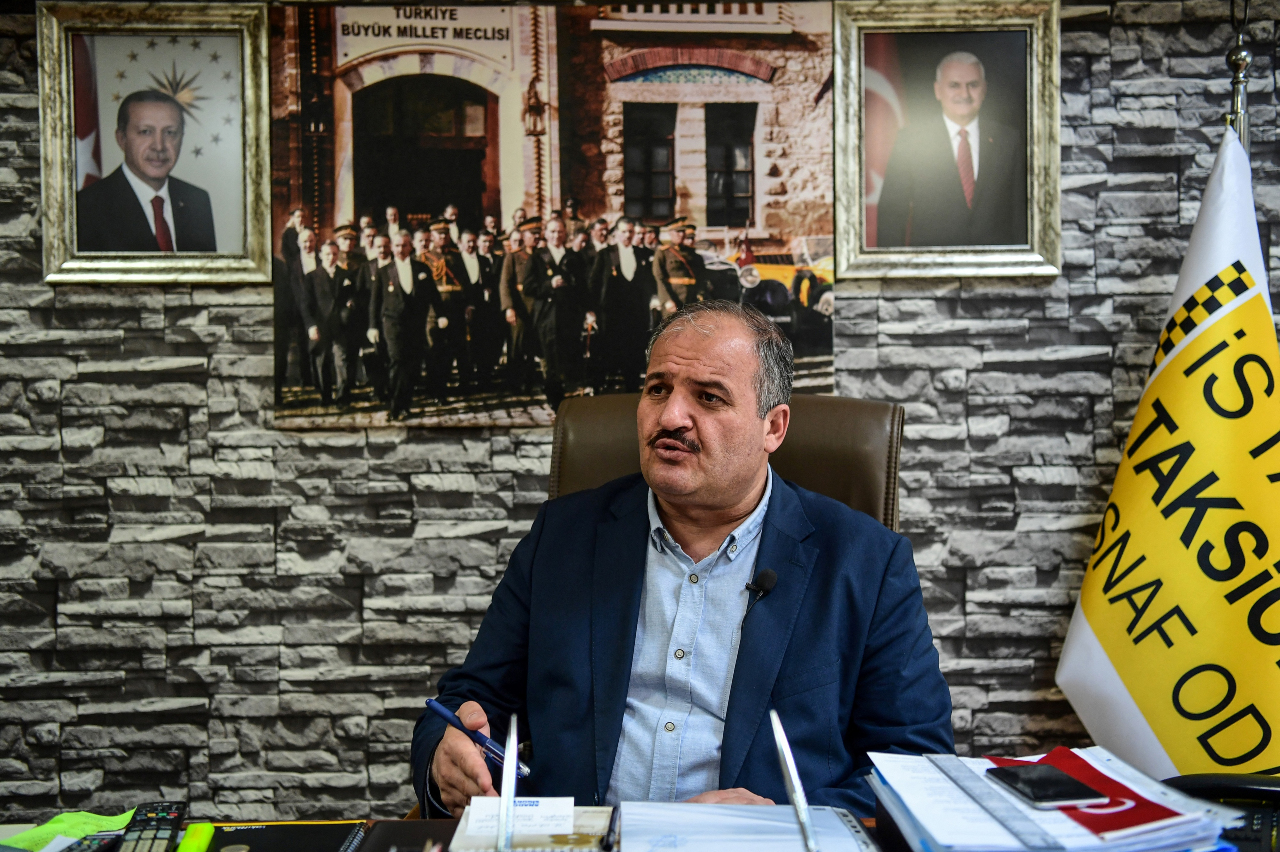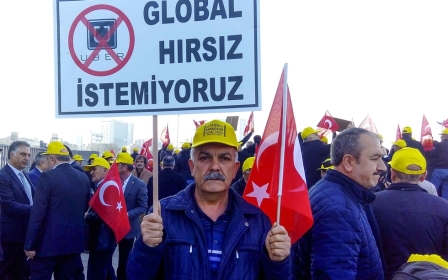Istanbul: Frustration grows as taxi shortage creates transport angst

It was a rainy day when Sumeyra’s baby was left badly bleeding after hitting his head against some marble while at home.
The doctor at a primary care clinic told Sumeyra that she needed to take her baby to a well-equipped hospital as soon as possible. The fastest way was to take a taxi. The clinic called a taxi stand, telling them “we need a taxi to take a baby to the public hospital".
New MEE newsletter: Jerusalem Dispatch
Sign up to get the latest insights and analysis on Israel-Palestine, alongside Turkey Unpacked and other MEE newsletters
The response was disappointing and unexpected: “no way can I send a taxi to a side street in this rainy weather".
Desperate to get her child treated, Sumeyra had to implore another patient at the clinic with a car to help her take her son to the hospital before the baby lost too much blood.
This kind of experience is becoming more and more common.
Istanbul, with an official population of 16 million and an unofficial population of 20 million, has a growing taxi problem.
The residents of Turkey's largest city frequently complain that the number of cabs is inadequate, the vehicles are uncomfortable, the drivers are rude, and that prices are unfair.
Taking a taxi is often a nightmare for tourists as most drivers request huge fares even for very short distances.
'God help you!'
Mohammad, a British businessman who frequently visits Istanbul, told Middle East Eye that he was afraid to take a cab because he didn't like having to bargain so intensely.
“When they [the drivers] understand that you are a tourist, they take you on the longest route, and request what is written in the taximeter [in Turkish liras] as dollars or euros," he said.
"Sometimes, they ask for a price at the beginning of the trip. If you are going to an airport or to Istanbul’s other side, God help you!”
Mohammad is not alone in his complaints. During an inspection in August, a policeman pretended to be a tourist and took a taxi. The driver asked for 500TL ($56) to take him from Taksim to Sisli, which is approximately 3.5km. The official price is 17TL ($2).
In a similar inspection, where a policeman pretended to be an Arab, the taxi driver refused to even turn on the taximeter and asked for a fixed price instead.
For locals, it has become a matter of luck to find a taxi, convince the driver to go to certain areas - especially traffic-intensive districts - and to travel comfortably.
Ozge, who works for a private company on Istanbul’s Asian side, told MEE that he would rather take a taxi than drive his own car but it was impossible to find one at peak times.
"I can’t convince drivers to take me for short distances, like 3km to 5km. More weirdly, they don’t want to go to further away districts either, claiming that they spend most of their time in the traffic.
"So, instead I use my own car and don’t mess with the drivers.”
Even celebrities say they can't find taxis in central districts or at airports, since taxi drivers prefer tourists.
'Corrupt order'
The MEE team took a taxi in Maltepe, a district on Istanbul’s Asian side, to travel to Bostanci, barely 10km away.
The driver, Sabri, was unhappy that we had to go through the main route, meaning that we had to stay in a traffic jam.
Asked why he was reluctant to go to Bostanci, he explained: “look, I would take you everywhere with a smiling face if I were earning enough money.
"I give 500TL ($60) a day to the owner of my license plate, spend 150TL ($18) on oil, 150TL ($18) on insurance, in total I spend 800TL ($96) daily.
"I am allowed to drive this car for a maximum of 12 hours. So, I have to first earn 800TL just to meet my expenses, then I can begin making money.”
Describing soaring prices in Turkey, which is beset by inflation, Sabri said: “I have two kids. Both go to school. I pay rent. I need to earn at least 7,000 TRY ($800) monthly so that I can survive.
"Now, you ask me why I sulk for spending almost half an hour to take you for a short distance.
"Go and ask the bosses, the government who are happy with this corrupt order,” added Sabri, who was paid 40TL ($4.50) for the trip.
Illegal practice
Taxis in Istanbul have special licence plates that are often bought and sold by people like a commodity.
The licence plate owners do not usually drive their cars, but rent the licence plates to private companies who then assign drivers to them.
This occurs despite the fact that according to regulations it is illegal to let a plate to a private company.
“For instance, the company that holds my taxi’s plate has at least 800 other plates,” Sabri said. “They pay the plate owner regularly and exploit our labour.”
Hamza, a licence plate owner, told MEE that he had no alternative but to let his plate to such a company.
“It is impossible to find an honest driver, who will pay me regularly and take care of the car," he said. "The company pays to me every month. I feel so comfortable.”
'Nobody dreams of becoming a taxi driver'
Many Istanbul residents complain that taxi drivers are uneducated, chain-smokers, rude, and even criminals.
Sabri admits that the drivers are problematic: “who would accept driving a car in Istanbul for 12 hours incessantly?
"Which qualified person would do so? I was running a store but fell into bankruptcy. I do this job because I have no other option. Nobody dreams of becoming a taxi driver.”
Taxi drivers are mostly accused of being rude and even aggressive. Even the Transportation Ministry has highlighted their behaviour as a major problem.
The ministry asked the Istanbul Municipality to train drivers and issue an official licence to be able to work as one.
While the municipality already does this, a lack of inspections makes it impossible to know whether a taxi driver has an official licence or not.
Increase rejected
There are 17,395 licensed taxis operating in Istanbul, serving an area that stretches 80km from one side to the other, and covers 5,300 square kilometres.
New taxi plates have not been on sale since the 1960s with the exception of provisionary decisions in the city - meaning the number of taxis on Istanbul’s roads has not changed in more than half a century.
The Istanbul Municipality, which is headed by Mayor Ekrem Imamoglu, a member of the opposition Republican People's Party, has offered to increase the number of taxis, first by 5,000 and then by 1,000.
However, both offers have been repeatedly rejected by the city’s transportation coordination body, most recently earlier this month.
Representatives of the ruling Justice and Development Party (AKP) argued that public transportation should be developed instead of allowing more taxis, which they said would only increase traffic jams. However, there have so far been no new offers or plans from the government.
The Istanbul Municipality argues that with its population constantly increasing, the city is desperately in need of more taxis.
Supporting the municipality’s efforts, Fatih Altayli, a high-profile Turkish journalist and columnist, highlighted the number of taxis in Istanbul compared with other major international cities.
“Paris’ population is 2.2 million and the number of taxis is 17,137, while London has 25,000 taxis for a nine million population, along with other (taxi ride) applications,” he said.
Technological solution
Meanwhile, Imamoglu has highlighted how licence plate owners and plate-running companies are violating rules, as well as accusing them of creating a monopoly.
“The office that will decide whether Istanbul residents need more taxis or not is the companies," said Imamoglu.
"We will not sacrifice this process [of increasing the number of taxis] to this rentier system.”
In response, Eyup Aksu, head of the Istanbul Taxi Drivers Chamber, said: “[There is] no need to increase the number of taxis.
"We need technology to connect customers with available taxis.”
Despite the availability of such smartphone applications, drivers are allowed to ignore or reject requests.
Ozge said: “I find these applications useful when there is no traffic. But again, in the peak times, drivers don’t take the calls.”
In a frustrated tone, Sumeyra said: "How is it possible that taxi drivers can refuse a call.
"It means that they are lying. They must be earning so much that they decide which customer to take or not.”
Uber and similar applications were popular in Istanbul until the government banned them following pressure from the Taxi Drivers Chamber.
The chamber vehemently opposed sharing the market on the grounds that Uber and others were not paying taxes.
However, it is unclear whether current taxis are forced to pay their taxes, while the ban on such applications has given rise to unlicensed vehicles, further complicating the taxi problem.
Middle East Eye delivers independent and unrivalled coverage and analysis of the Middle East, North Africa and beyond. To learn more about republishing this content and the associated fees, please fill out this form. More about MEE can be found here.







